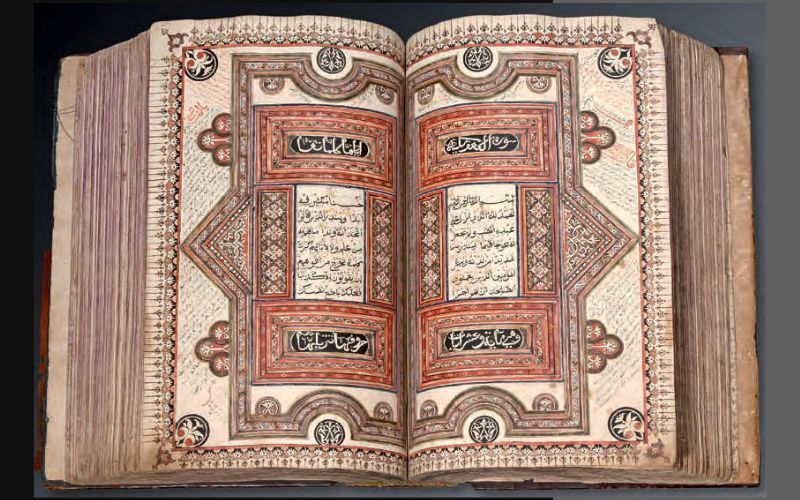610 Muhammad receives the Qur'an, which instructs us to do good to all (4:36) and includes the golden-rule like saying: "Woe to those who cheat: they demand a fair measure from others but they do not give it themselves" (83:1-3). Several Hadiths (Bukhari 1:2:12, Muslim 1:72f, and An-Nawawi 13) attribute this golden rule to Muhammad: "None of you is a true believer unless he wishes for his brother what he wishes for himself."
650 Imam Ali, Muhammad's relative, says: "What you prefer for yourself, prefer for others; what you find objectionable for yourself, treat as such for others. Don't wrong anyone, just as you would not like to be wronged; do good to others just as you would like others to do good to you; that which you consider immoral for others, consider immoral for yourself."
700 Shintoism in Japan expresses the golden rule: "Be charitable to all beings, love is God's representative. Don't forget that the world is one great family. The heart of the person before you is a mirror; see there your own form."
810 The Book of Kells, a gospel book lavishly illustrated by Irish monks, illustrates the golden rule as a dog extending a paw of friendship to a rabbit.
890 King Arthur's Laws emphasizes the golden rule: "What you will that others not do to you, don't do to others. From this one law we can judge rightly."
1060 Confucian philosopher Zhang Zai writes: "If one loves others just as one is disposed to love oneself, one realizes benevolence completely. This is illustrated by the words 'If something is done to you and you don't want it, then for your part don't do it to others.'" (Nivison 1996: 67)
1093 Muslim Abu Hamid al-Ghazali in his Disciplining the Soul (the section on discovering faults) uses the golden rule: "Were all people only to renounce the things they dislike in others, they would not need anyone to discipline them."
1140 Gratian, the father of canon law, identifies natural law with the golden rule: "By natural law, each person is commanded to do to others what he wants done to himself and is prohibited from inflicting on others what he does not want done to himself. Natural law is common to all nations because it exists everywhere by natural instinct. It began with the appearance of rational creatures and does not change over time, but remains immutable." (Pennington 2008)
1170 Moses Maimonides's Sefer Hamitzvoth (positive commandment 208) says: "Whatever I wish for myself, I am to wish for another; and whatever I do not wish for myself or for my friends, I am not to wish for another. This injunction is contained in His words: 'Love your neighbor as yourself.'"
1200 Inca leader Manco Cápac in Peru teaches: "Each one should do unto others as he would have others do unto him." (Wattles 1996: 192)
1200 The Tales of Sendebar, a popular romance in many languages, ends with words from the sage Sendebar to a king of India: "'My request is that you don't do to your neighbor what is hateful to you and that you love your neighbor as yourself.' The King did as Sendebar counseled him and was wiser than all the sages of India." (Epstein 1967: 297-9)
1220 Francis of Assisi, who often invokes the golden rule, at least four times formulates it using a same-situation clause (the earliest such use that I'm aware of), as in "Blessed is the person who supports his neighbor in his weakness as he would want to be supported were he in a similar situation."
1230 Muslim Sufi thinker Ibn Arabi sees the golden rule as applying to all creatures: "All the commandments are summed up in this, that whatever you would like the True One to do to you, that do to His creatures."
1259 Gulistan, by the Persian poet Sa'di, has these verses, which are now displayed at the entrance of the United Nations Hall of Nations: "Human beings are members of a whole, In creation of one essence and soul. If one member is afflicted with pain, Other members uneasy will remain. If you have no sympathy for human pain, The name of human you cannot retain."
1265-74 Thomas Aquinas's Summa Theologica (I-II, q. 94, a. 4) says the golden rule is common to the gospels and to human reason. He adds (I-II, q. 99, a. 1) that "when it is said, 'All things whatsoever you would that men should do to you, do you also to them,' this is an explanation of the rule of neighborly love contained implicitly in the words, 'You shall love your neighbor as yourself.'"
1400 Hindu Songs of Kabir (65) teach the golden rule: "One who is kind and who practices righteousness, who considers all creatures on earth as his own self, attains the Immortal Being; the true God is ever with him."
1400 Sikhism from India teaches: "Conquer your egotism. As you regard yourself, regard others as well." (Shri Guru Granth Sahib, Raag Aasaa 8:134)
1477 Earl Rivers's Dictes and Sayings of the Philosophers, the first book printed in England, has (p. 70): "Do to other as thou wouldst they should do to thee. And do to noon other but as thou wouldst be doon to."


